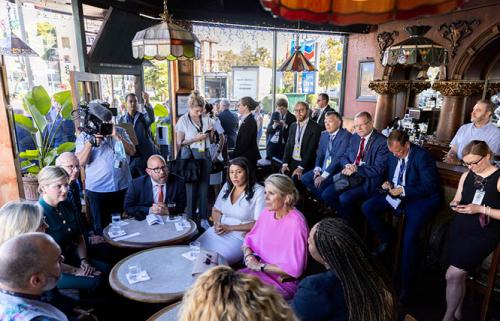Seated before the glass windows of San Francisco’s Twin Peaks Tavern, the first gay bar in America whose patrons could be easily seen from the street, Queen Máxima of the Netherlands engaged in a conversation no different than ones that can be heard in the historic watering hole any day of the week.
For roughly 20 minutes she discussed with half a dozen of the city’s LGBTQ leaders the ongoing monkeypox outbreak, various obstacles transgender individuals face, and the LGBTQ community’s myriad legal battles in the U.S. Joining the group seated around three of the bar’s indoor tables was San Francisco Mayor London Breed.
“We got some international stars here,” noted Breed, who helped escort the Dutch queen through the city’s LGBTQ Castro district the morning of September 6.
With a crush of onlookers and journalists gathered outside of the bar at the intersection of Castro and Market streets, Máxima first engaged with San Francisco AIDS Foundation CEO Tyler TerMeer, Ph.D., a 39-year-old gay Black man who is of Dutch ancestry. He gave a brief synopsis of the 40-year-old agency’s evolution from addressing the HIV/AIDS epidemic to offering myriad health services today.
“We fight for the health and justice for all individuals,” said TerMeer, adding that a main component of its current work is to “address the drug crisis we have in our community.”
It prompted the queen to ask of the agency’s focus, “so it has gone beyond HIV and into more health issues?”
Gay District 8 Supervisor Rafael Mandelman, who represents the Castro at City Hall and also helped escort Máxima around the neighborhood, pointed out how the agency has been involved in the efforts this summer to vaccinate people against MPX and has spoken out about the U.S. government’s slow response in addressing the health crisis impacting primarily men who have sex with men.
“It has been a struggle to get vaccines into the city,” noted TerMeer, adding that his agency worked to not only “raise alarm here” about MPX but also worked to educate the public about who “should get tested and treated” for the virus.
The conversation then pivoted toward health care for transgender individuals and other services the city is providing to address the needs of the local trans community. Aria Sa’id, a Black trans woman who is the president and chief strategist of the Transgender District in the city’s Tenderloin neighborhood, informed the queen about how San Francisco has been a leader in educating health professionals about trans cultural competency and directing resources toward addressing the stigma that trans people face.
But she acknowledged problems continue to persist, with a major hurdle being trans people finding employment in the city. It signals the ongoing lack of full acceptance in the city for the trans community, said Sa’id.
“Our framework really is if the world does not hire us,” she told the queen. “If you drive around, chances are you are not going to find trans people working at the dry cleaners, or at the bar or at your coffee shop. And a huge part of that is there is just still a great deal of stigma. There is almost a tolerance of trans people even in San Francisco but not a full sort of acculturation.”
To which Máxima, sheathed in a hot pink three-quarter sleeve dress, responded that in the Netherlands, “we have the same thing — tolerance but significant intolerance.”
Breed pointed to the various programs the city has rolled out in recent years to assist trans residents, from having one of the first offices for trans initiatives in the world to funding a universal income program for trans people and helping them access housing resources. The city is committed to ending trans homelessness by 2027.
“We are talking about a small amount of people but disproportionately they have challenges with accessing housing, more so than almost anyone else,” said Breed. “It is typically oftentimes people of color who have some of the challenges. We are really focusing resources on the community.”
In listening to and working with local trans leaders, the city has been “very deliberate,” said Breed, about the decisions it has made. She also said she ignores the pushback the city has received for its funding such programs and resources.
“The sad reality is the stigma, the challenges, the controversy, the pushback, and some of the things people say about the initiatives I could care less,” said Breed. “I think part of it is we just have to move forward and be aggressive and very intentional. We can’t just talk about things; we have to invest in these changes.”
Her resolve comes from the positive feedback she has heard directly from trans individuals who have benefited from the programs, said Breed.
“I got to tell you, after Trans Home SF started right before I became mayor how many people came up to me to say, ‘Thank you for investing in this. It changed my life,'” recalled Breed, formerly president of the city’s Board of Supervisors who was elected mayor in a special election in 2018.
At one point the queen turned to Sa’id to inquire about the mayoral trans office and its effectiveness. In response Sa’id explained how her organization and others advised the city on its creation and have since worked closely with it to push forward the various programs.
“It’s been a bridge to city government for the community and trans-led organizations to engage more directly with the city,” she said. “Most governments have their bureaucracy.”
“It helps go through the bureaucracy,” remarked Máxima.
“We sort of dictate to them what we would like them to prioritize,” responded Sa’id.
The conversation ended with a short exchange between the queen and National Center for Lesbian Rights Executive Director Imani Rupert-Gordon, who explained the focus of the legal advocacy organization’s work. Rupert-Gordon, a Black married lesbian, noted her agency not only addresses “LGBTQ equality” but also social justice and health access issues that impact a wide spectrum of people and marginalized groups.
To which Máxima responded, “a real inclusion.”
Media briefing
At that point a reporter for the Bay Area Reporter was asked to join the rest of the local and Dutch press corps outside for a media briefing by Breed and the 51-year-old Dutch royal, born Máxima Zorreguieta in Argentina.
“You know, the Netherlands and San Francisco share so many things in common but this support to LGB community it is something we feel so strongly about,” noted Máxima in her brief remarks.
Lesbian San Francisco LGBT Community Center Executive Director Rebecca Rolf and Thomas Horn, a gay man who chairs the San Francisco Host Committee, the nonprofit arm of the mayor’s protocol office, also took part in the conversation with the queen. Horn, a former publisher of the B.A.R. who serves as honorary consul of Monaco in San Francisco, later said of the queen, “She asked smart questions.”
Sa’id told the B.A.R. she very much appreciated the queen’s “understanding of trans issues” and wanting to learn about ways to address them.
“I think the realities that exist in San Francisco also exist in other modern-thinking countries in the world,” she said.
According to the mayor’s office Máxima was the first royal to officially visit the city since 2005, when then-Prince Charles of England toured the Bay Area shortly after his marriage to Camilla Parker Bowles, then the Duchess of Cornwall. Due to the death September 8 of his mother, Queen Elizabeth II, he is now King Charles III and his wife, is the queen consort.
King Willem-Alexander of the Netherlands, who married Máxima in 2002, was to have joined his wife and the other Dutch dignitaries on their American visit to both the Golden State and Texas. But he had to cancel at the last minute due to becoming ill with pneumonia and his doctors advising him against traveling overseas.
Keep abreast of the latest LGBTQ political news by following the Political Notebook on Twitter @ http://twitter.com/politicalnotes
Got a tip on LGBTQ politics? Call Matthew S. Bajko at (415) 829-8836 or e-mail m.bajko@ebar.com
Help keep the Bay Area Reporter going in these tough times. To support local, independent, LGBTQ journalism, consider becoming a BAR member.








